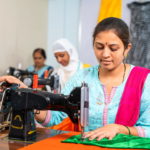Access to high-quality childcare is central to advancing women’s economic and social agency while promoting children’s development. However, in many LMICs, childcare markets are largely informal, with care often provided in unregulated home-based settings. As a result, childcare is often of poor quality, while also being unprofitable and unaffordable. Mothers typically bear the burden of…
Gender
Occupational Segregation and Gender Gaps in Nairobi
We study the interlinked role of beliefs, preferences, and search by workers and firms in driving occupational segregation and wage inequality for women in Nairobi, Kenya. Our project address four questions within this agenda: (1) (How) do employers treat women and men differently in the hiring process? (2) (How) do men’s and women’s preferences over…
Long–Run Social Norms and Female Labour Force Participation in India
India’s gender inequality and low female labour force participation rate (FLFP) are in stark contrast to its position as the fifth-largest economy in the world. Fewer than 25% of women work outside the home, and historical patriarchal norms are widely believed to be a factor. However, research on the impact of social norms on female…
Women’s Employment and Family Decisions in Sub-Saharan Africa
Our project studies the role of the public sector and the opportunities it can provide for women’s employment and the gender pay gap in low-income countries (LICs). Using the preliminary evidence from microdata for a number of SSA countries, we show that the public sector in poor economies behaves very differently from private firms: it…
LinkinOut Harassment
The issue of sexual harassment in the workplace remains pervasive, despite being illegal and a violation of human rights. Approximately one in two women experience sexual harassment during their work lives, with half of them experiencing three or more incidents. However, reporting of harassment is often hindered by stigma, psychological costs, and fear of retaliation.…
Studying the Latent Demand for Female Labour in Rural India
In lower-middle-income countries, it is estimated that 35.5% of women over 15 participated in the labour force in 2018. Despite India’s rapid economic growth and increasing educational attainment, female labour force participation (FLFP) continues to lag behind, where the figure stands at a mere 29.4% (PLFS, July 2021-June 2022). There has been a burgeoning body…
Depression Treatment and Female Performance in the Labour and Marriage Markets in India
Depression is the leading cause of disability worldwide, with a lifetime prevalence of 15-20% and a higher prevalence among the poor. Depression symptoms include anhedonia, impaired attention, and fatigue. People with depression and their families also face pervasive stigma and discrimination, particularly in India and other LMICs. Impacts are felt through the household by requiring…
Leveraging Community-Based Childcare to Address Gender Gaps in Labour Market and Educational Outcomes Across Multiple Generations in Ethiopia
The project, to be conducted jointly by the Centre for Global Development (CGD) and Policy Studies Institute (PSI), aims to answer the following questions by evaluating a randomized trial of community-based childcare and early learning facilities as part of Ethiopia’s flagship Productive Safety Net Programme (PSNP): What is the impact of providing affordable childcare to…
Information Frictions and Gender Inequality in Online Labour Markets
Information asymmetry on the part of job seekers or applicants and employers may lead to skills mismatches that increase gender inequality in labour markets. Can online labour markets close gender gaps in employment by smoothing information frictions? And to what extent does providing more information to both applicants and firms lead to improved matching and…
Long-Run Impacts of Factory Jobs: Labour Market Outcomes, Wellbeing, and Fertility in Ethiopia
In recent years, Ethiopia has become a hub for textile and garment manufacturing. These factories provide employment opportunities in low-skilled jobs, drawing many young women into the formal labour force. Although the factories create formal jobs in a labour market characterized by a lack of wage employment opportunities, an important question remains whether low-skilled factory…









